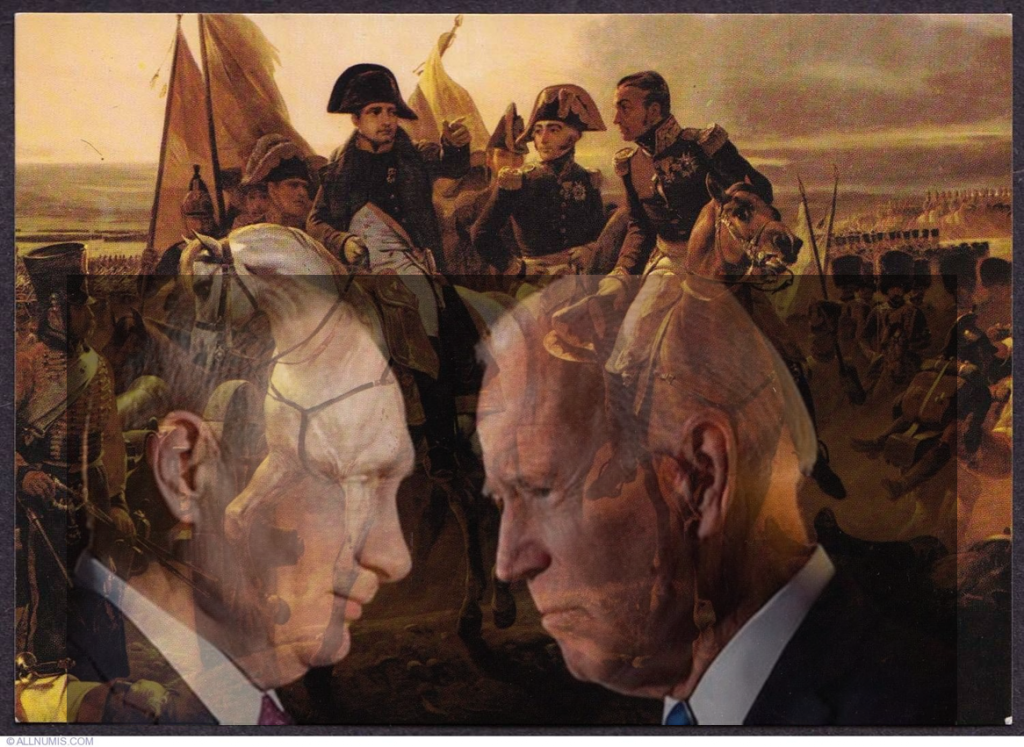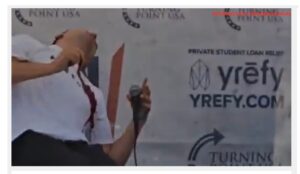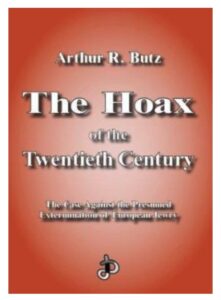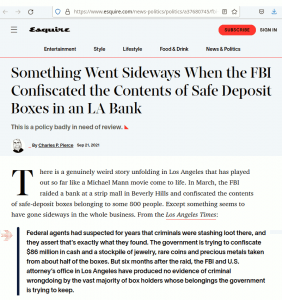William de Berg
Media pundits and leading politicians claim Russia’s intervention in Ukraine will be Russian President Vladimir Putin’s “Waterloo”,[1] a reference to the final, crushing defeat of Napoleon’s forces in 1815 in what is now present-day Belgium. They may have it backwards, though: The real Waterloo analogy may be better applied to the collapse of Putin’s opponent—the Anglo-American Bilderberger/NATO empire in the West.
Afghanistan has often been referred to as the “graveyard of empires”, but this bears little historical reality.[2] Alexander the Great conquered the satrapies in Afghanistan and other parts of Central Asia and his minions ruled for over two hundred years thereafter. So, too, did the Mongols easily conquer Afghanistan and rule for almost two hundred years. The real “graveyard of empires” in the 19th and 20th centuries is Russia, whose single-handed thrashing of the armies of Napoleon and Hitler led directly to the dissolution of each’s over-extended empire.
The largest empire today—and arguably in the history of the world—is the Anglo-American financial/military alliance. It took remnants of the British and American pre-WWII empires and combined them with the spoils of the Allied victory in World War II to dominate the political and cultural affairs of most of the world in the second half of the 20th Century. Western Europe owed its noncommunist revival after World War II to the Marshall Plan and the presence of American troops in many of its nations. But most European nations, such as Germany, served thereafter more as affluent vassals than equal partners in the postwar Anglo-American alliance and its plethora of organizations such as NATO, the Bilderbergers, and the Trilateralists. NATO was supposedly designed to unite Europeans and Americans against the Bolshevik Soviet Union, but in reality its purpose was not only to keep the Russians out but also “the Americans in [Europe], and the Germans down”.[3] There were dissenting voices along the way, such as that of President de Gaulle of France, who pulled France out of NATO in 1967 and argued that all Europeans (including Russians) should be joined in a union from the “Atlantic to the Urals”.[4] But eventually France was retrieved into the NATO fold and the alliance marched on.
After the collapse of the Soviet Union in 1991, the first two legs of the rationale for NATO appeared to have been pulled out from under it. Russia was brought to its knees by Project Hammer and the rape of the Russian economy by the Western bankers and their Russian oligarchs.[5] There was no longer a need to fear a broken Russia and, consequently, no need for American troops in Europe. Despite serious calls for the replacement of NATO by a European Army, most notably by French President Macron (thereby invoking the ghost of De Gaulle),[6] a temporary new role for NATO was found in trying to dominate the resource-rich Middle East and North Africa and the Balkans. This led to disastrous official and unofficial NATO forays into Iraq, Syria, Libya, and Afghanistan and the picking off of Kosovo from Serbia. Rather than dissolving, NATO by the advent of the 21st century began to acquire the Republics of the former Soviet Union and the remnant nations of the defunct Warsaw Pact alliance, eventually enveloping almost all of Europe and placing it on the doorstep of Russia in several regions.
Enter Vladimir Putin. The former acolyte of Russian President Boris Yeltsin was expected to be as subservient to the West as his predecessor, but he gradually turned the tables on the Anglo-American alliance. Undeterred by Western sanctions and fluctuating energy prices, he performed some of the most amazing domestic feats of the 21st Century, including doubling Russia’s GDP, completing a vast infrastructure renewal, increasing male life expectancy from 65 to 73 years, reducing the murder rate from >30 to <5 per 100,000, rebuilding and modernizing Russia’s military, and increasing Russia’s gold reserves six-fold. On the foreign front, he quickly snuffed out the longstanding rebellion in the border state of Chechnya that was fomented by Turkey and the United States, punched Georgia in the nose by picking off two Russian-speaking regions that had been mistreated by the Georgian government, re-established much of the old Soviet Union in the form of the Eurasian Economic Union, and successfully intervened to salvage the government of beleaguered President Assad in Syria.
None of this pleased the Anglo-American empire, which quickly turned the G8 economic group into the G7 by kicking out Russia. Meanwhile, Germany and other European nations attempted to expand trade with resource-rich Russia, highlighted by the Nord Stream 2 natural gas pipeline. This would have lessened their dependence on the Anglo-American empire and eventually led to the dissolution of NATO—but this, too, did not sit well with Washington and London. For it wasn’t just the Russians the British distrusted and skirmished with in the 19th and 20th Centuries; the British and their bankers, the Rothschilds, harbored a longstanding fear of a rich, powerful, and independent Germany as their global competitor. Two world wars were fought that destroyed Germany as a military power, and the Teutonic giant was not going to be allowed after the fall of the Soviet Union to go rogue on the Anglo-American bankers a third time.
Unlike Napoleon and Hitler, NATO never actually inserted any troops into Russia, but it nevertheless provoked the Russian bear by its massive sanctions, various attempted coups in its neighbors, and a threat to deposit NATO troops on Russia’s very doorstep in Ukraine and elsewhere. These “hard” measures were buttressed by a barrage of “soft” measures, including the incessant demonization of Russia and its president in official circles and the Western media and the unprecedented humiliation of barring Russia’s athletes, on the basis of disputed testimony, from representing their nation for four straight Olympics.
The demonization and attempted isolation of Russia will continue after Putin demilitarizes Ukraine—which he will, at whatever cost. Putin, however, doesn’t care how much virtue signaling occurs among anti-Russian celebrities in the West, how much international bodies bar his athletes and artists, how much damage the West does to his economy in the short run, how much fake Western news reports such as the “Ghost of Kiev” report his imminent defeat, how many small arms and mercenaries the West deposits after-the-fact in Ukraine, or any other measures of little military consequence. He doesn’t care because he believes Russia is in an existential fight, just as it was when Napoleon and Hitler rampaged on its soil, because if the combined Western armies of NATO threaten Russia at its doorstep it will have “nowhere to retreat”.[7]
When the shooting ends, Russia will on its western front border an ally in the pro-Russian richest half of Ukraine, with all its industry, mining, seaports, and most of its technological capabilities, while the West will inherit a desperately poor Western Ukraine riddled with right-wing extremists. Essentially invulnerable at that point, the Russian counterattack will then begin with a fury. The West may think that a lopsided vote in the United Nations General Assembly turned the world against Putin and Russia, but the 40 nations that didn’t vote against the Russian intervention in Ukraine contain slightly over half of the world’s population and the vast majority of its key resources. Whereas the depleted West has little to offer the world aside from toppling governments, raiding resources, and pushing dangerous vaccines, Russian and its Eurasian allies will tighten the screws on the flow of natural gas, oil, key minerals, and even fertilizer that will create hyperinflation and economic darkness in Europe and America. What could have been obtained cheaply in honest trade will now come at a huge price, not just financial but also in terms of political fealty to the Russian bear. At that point, Germany, France, Italy, and other key nations of Western Europe will have to choose between NATO and Russia. Will those nations throw off the yoke of a “brain-dead” (in Macron’s words) NATO to save themselves? If so, it will be clear who won the battle of “Waterloo 2022”.
William de Berg is the pen name of an American scientist and author of four conspiracy/truther fiction novels: Serpent and Savior, White Spiritual Boy, Divided We Stand, and Shield Down.
References
[1] https://www.shkmgmcnuh.org/ukraine-will-be-putins-waterloo-says-european-commission-vice-president/2226602022
[2] https://www.politico.com/news/magazine/2021/08/28/afghanistan-graveyard-britain-us-russia-506990
[3] https://www.washingtonexaminer.com/weekly-standard/what-is-the-purpose-of-nato-keep-the-russians-out-the-americans-in-and-the-germans-down
[4] http://www.eho.com.hr/news/on-23-november-1959-in-a-speech-in-strasbourg-de-gaulle-announced-his-vision-for-europe/9341.aspx
[5] https://www.conspiracyarchive.com/Articles/Bush-Family-Hammer.htm
[6] https://www.bbc.com/news/world-europe-46108633
[7] https://www.reuters.com/world/europe/putin-says-russia-has-nowhere-retreat-over-ukraine-2021-12-21




This article reveals things my “programmed to hate Russia” pals have no clue about. None of them ever heard of the Kazarian Mafia. I said if you never heard of Kazaria, you have no clue what’s happening in Ukraine. It was an interesting moment when Ken asked me to spell it. It dawned on them I knew a lot more about it then all of them put together. I always like to go back to the weapons of mass destruction story when I remind them how much the news lies to them and some things never change
Excellent and informative, William. Thank you for the fine work. bw
This was on Jim Stone. It’s good advice at any time, especially now AND especially if you are in California re those safe deposit vaults. Stone’s posts have been quite dire of late, but the following is just sensible right at this moment.
“Prediction: The first part of this is NOT financial advice, only a hunch –
They may control the price of oil somewhat, but gold is going up and it is NOT coming down again. I am keeping an eye on this. However, the control of the price, keeping it below 2000 has failed for too long.
NOW FOR ACTUAL ADVICE: I think they lost it. DO NOT, UNDER ANY CIRCUMSTANCE BUY PAPER GOLD. THE PEOPLE SELLING THAT HAVE NO INTENTION WHATSOEVER OF EVER DISHING OUT REAL GOLD, AT THIS POINT IN THIS MARKET THEY ARE JUST STEALING MONEY. THEY ARE ALL GOING TO FAIL.
IF YOU HAVE PAPER GOLD, EXCHANGE IT FOR REAL GOLD TODAY, NOT TOMORROW, THAT FANTASY IS OVER. IF YOU DO NOT HAVE IT IN YOUR HAND, IT WILL NEVER BE IN YOUR HAND, STARTING . . . . . name a random time no more than three months from now! MAKE THAT TODAY.
You will be better off risking being robbed in your home or subject to asset forfeiture than trusting in any bank or holding company, and safe deposit boxes are no good either, the bank will just rob those. In the United states it is perfectly legal for them to, at first they put the limit at “If you do not visit your safe deposit box for six months the bank can take whatever it is in it even if the box is paid” and moved that to: Any time any agency wants to rob a bank they can, and asset forfeiture makes it happen. They have already robbed entire banks this way, claiming every safe deposit box in the bank was used by drug smugglers.”
http://82.221.129.208/1/.tn4.html
https://givesendgo.com/fundingfetzer
Attachment